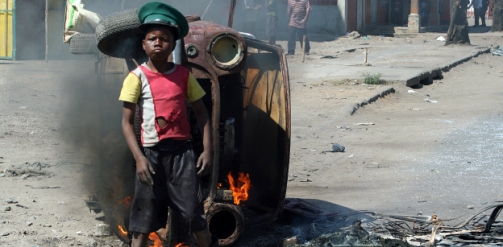The period of food price volatility between 2007 and 2012 sparked what observers have called ‘food riots’, which have historically marked moments of fundamental economic change, when states have lost their ability to preserve the welfare of citizens. Food riots, however, also usher in change, often heralding new forms of public accountability for hunger.

This research project explores what recent events say about this historic moment, and about the possibility of protecting food rights, by looking at the causes and consequences of food-related riots and right-to-food movements in Bangladesh, India, Kenya and Mozambique.
The need to strengthen accountability for food insecurity has become more pressing since the 2008 food price spike. Feeding the world in this context is a political challenge – how to institutionalise accountability and responsiveness towards the hungry – as much as a technical or economic one. With predictions of further volatility and price rises, this challenge is increasingly urgent.
The period since the mid 2000s offers an opportunity to study the popular politics of accountability for hunger, because of the not coincidental rise in the level of popular mobilisation around food globally.The right-to-food movements that emerged in developing countries since the mid 2000s and the upsurge in food riots and protests since 2007 both signal strong popular pressures for a response to the increasing uncertainties people face around access to food. Yet we have sketchy information about who mobilises, why and what they seek to change.
Watch a short film about the research and it’s key findings
About the research
This research project studies grievances around recent food price volatility, including the possibility that policy makers systematically under-estimated these, particularly the unmeasured impacts on well-being and women’s unpaid work in the care economy.
The research moves beyond assuming that people protest because they are hungry, to explore whether contemporary struggles are informed by popular ideologies prioritising rights to food over the freedom of markets in times of dearth. ‘Moral economies’ of this kind have been found in historical analogues to the present period of crisis and adjustment, and were often potent enough to elicit protective responses from political elites.
The research explores whether analogous ‘moral economies’ feature in the present. It also explores what globalisation means for the moral economy: the contemporary food policy regime features global integration, commodity speculation and pressures to liberalise trade, which both increase the likelihood of shocks (and protests), and constrain government responses. The research team is investigating the effects of popular food politics in this more globalised context, particularly whether popular mobilisation results in counter-productive protectionist policies.
The research team is also exploring the institutional and policy conditions under which the different forms of popular mobilisation – food riots or right-to-food movements – succeed in activating responses which institutionalise accountability and responsiveness for food security, particularly for women.
They are looking at the effects of how directly the food crisis is transmitted to the country context; pre-existing social protection provision; the strength and orientation of civil society; the political history of famine prevention; and the interaction and mutual influence of riots and rights movements.
Through the research the team will be generating policy-relevant knowledge of the determinants of the political will to act to address food insecurity and by creating new, more inclusive spaces in which civil society actors can engage with policy makers in dialogue about the right to food.
For more information, visit the project website: foodriots.org
Image credit: Getty images